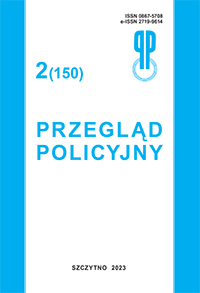Legitymowanie — regulacje prawne i praktyka stosowania
Identity Checks — legal provisions and practical applications
Author(s): Dorota Czerwińska, Wojciech Jasiński, Karolina KremensSubject(s): Constitutional Law, International Law, Public Law, Security and defense
Published by: Akademia Policji w Szczytnie
Keywords: ID checks;individual’s rights;body-worn cameras;restriction and deprivation of liberty;stop and arrest;police;
Summary/Abstract: The article discusses the regulation of identity checks in Poland and their practice. First, the article examines the constitutional and international law standards concerning identity checks. It is followed by the analysis of statutory and sub-statutory regulations relating to identifying a person focusing on conditions under which ID checks may be undertaken, agencies authorized to carry on the ID checks and the ways in which it must be carried on. The study underlines the important role of the case law in shaping the boundaries of the legality of ID checks. It is emphasised by the courts that the citizen’s duty to show their ID is predetermined by conducting a proper procedure by police officers, as well as by the existence of sufficient legal and factual grounds for checking one’s identity. The criteria of distinguishing between an ID check and a stop and arrest were also developed in the case law. In conclusions, it was pointed out that at the constitutional and international level there are no specific provisions relating to the identity checks. However, the Constitution of the Republic of Poland requires statutory regulation of the prerequisites and key issues of the procedure for carrying out an ID check. Analysis of the statutory regulation leads to the conclusion that the former element has not been met. The courts try to fill this with their case law, clearly indicating that and ID check may only be conducted if justified by sufficient legal and factual grounds. Nevertheless, the legislator’s intervention would be desirable. The authors also draw attention to the fact that the courts present a strict and well-grounded approach towards the distinction between identifying documents and detaining. The criterion in this case is not the purpose of the activities undertaken by the authorized body, but the degree and duration of the interference with the rights of the individual
Journal: Przegląd Policyjny
- Issue Year: 150/2023
- Issue No: 2
- Page Range: 19-42
- Page Count: 24
- Language: Polish

